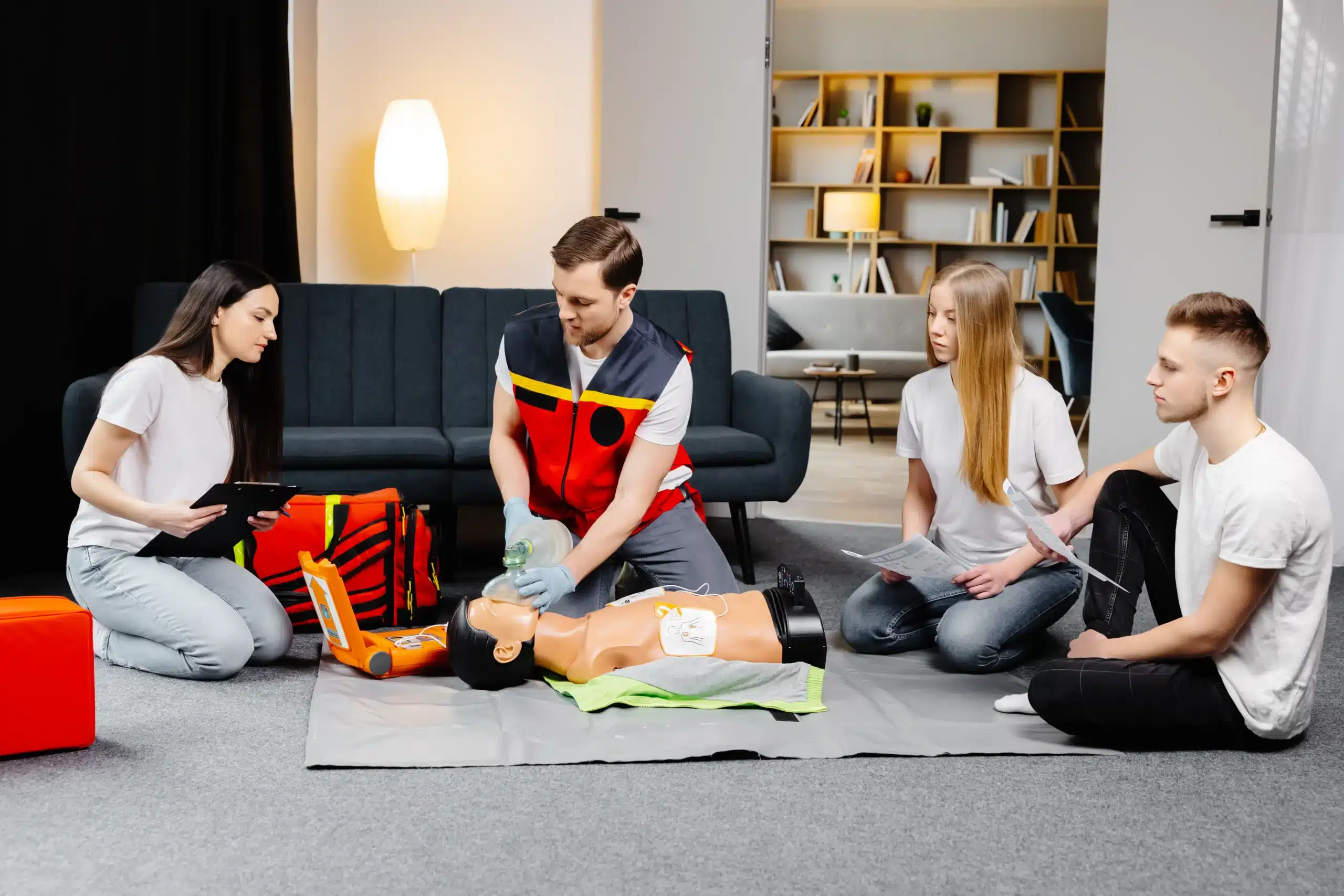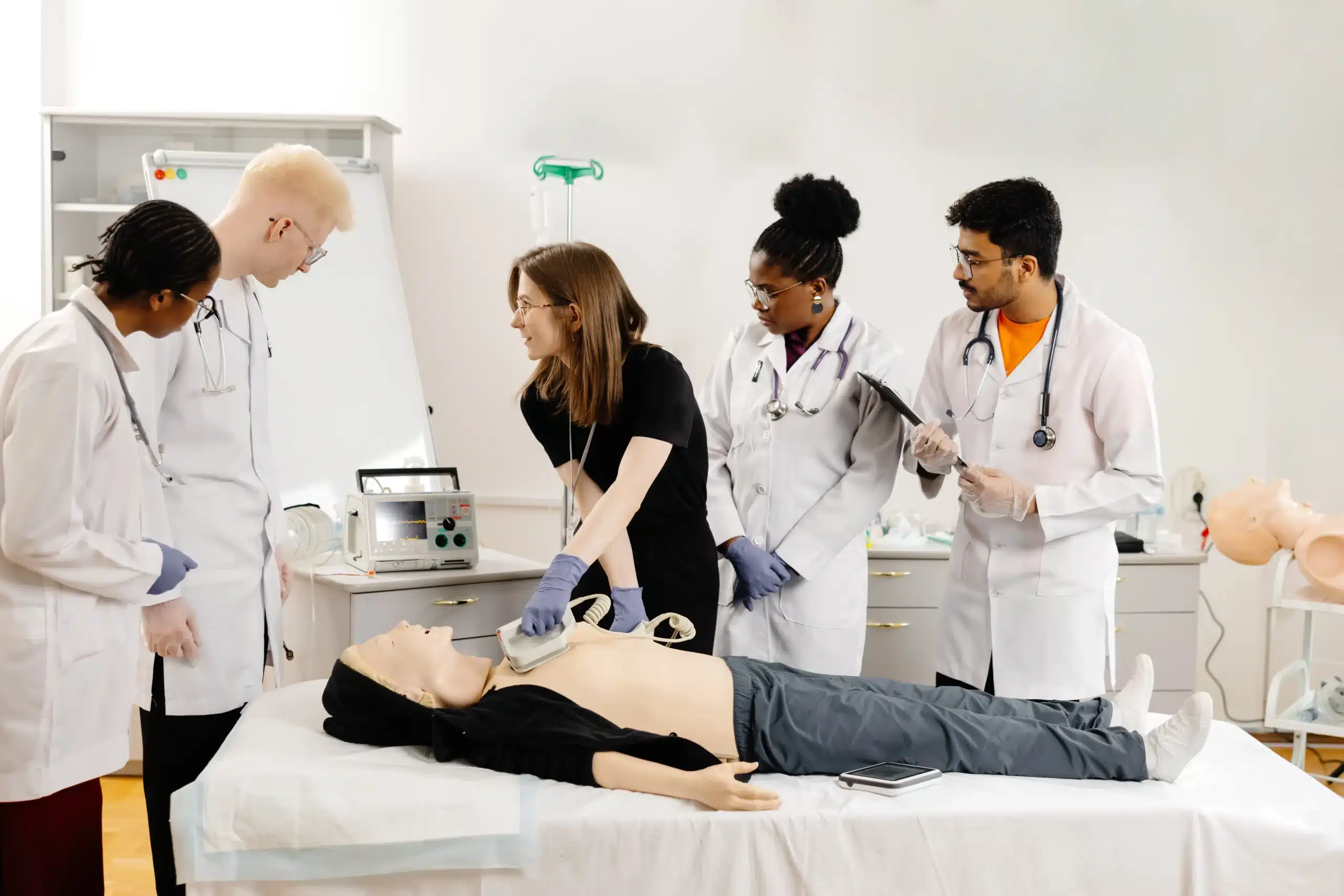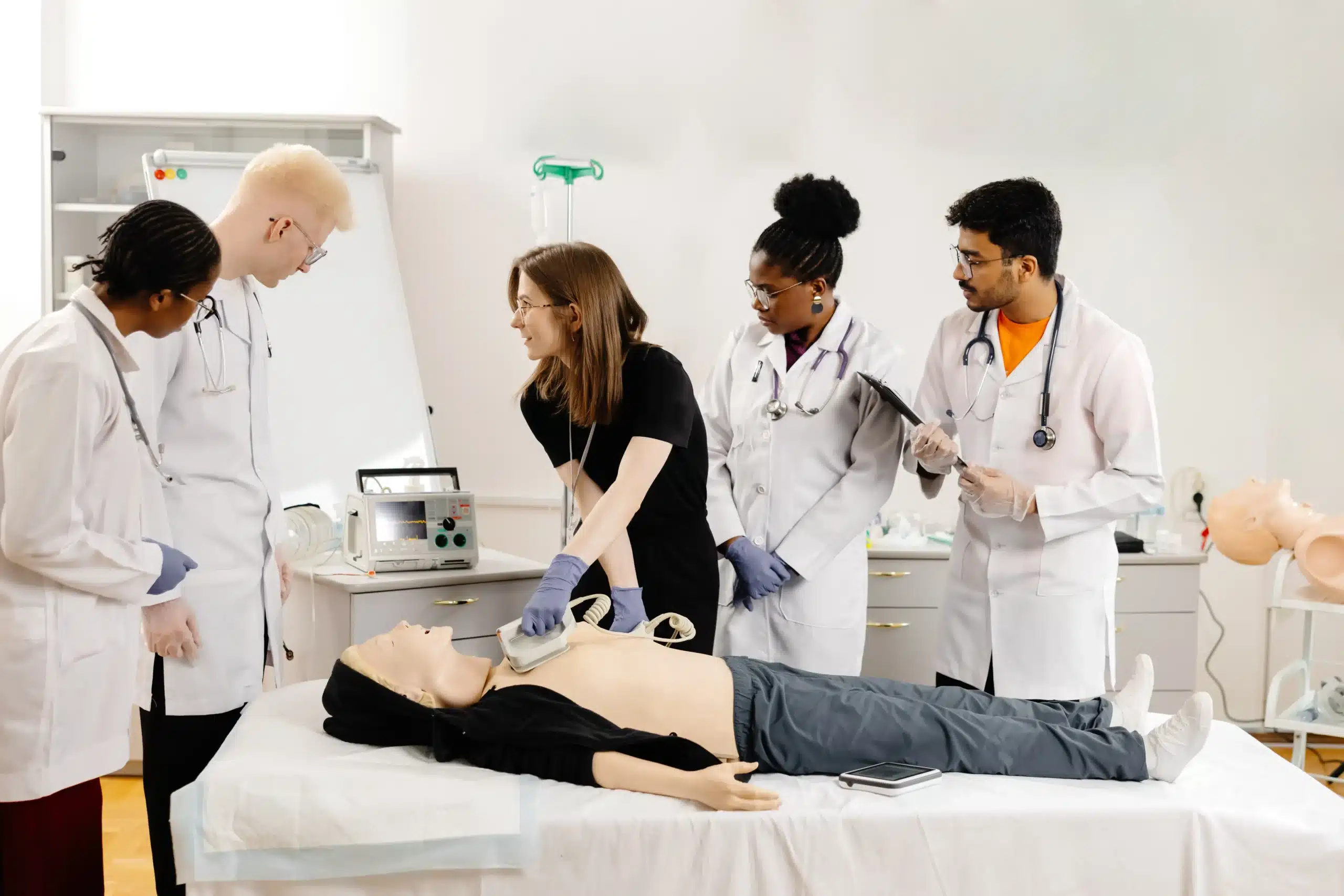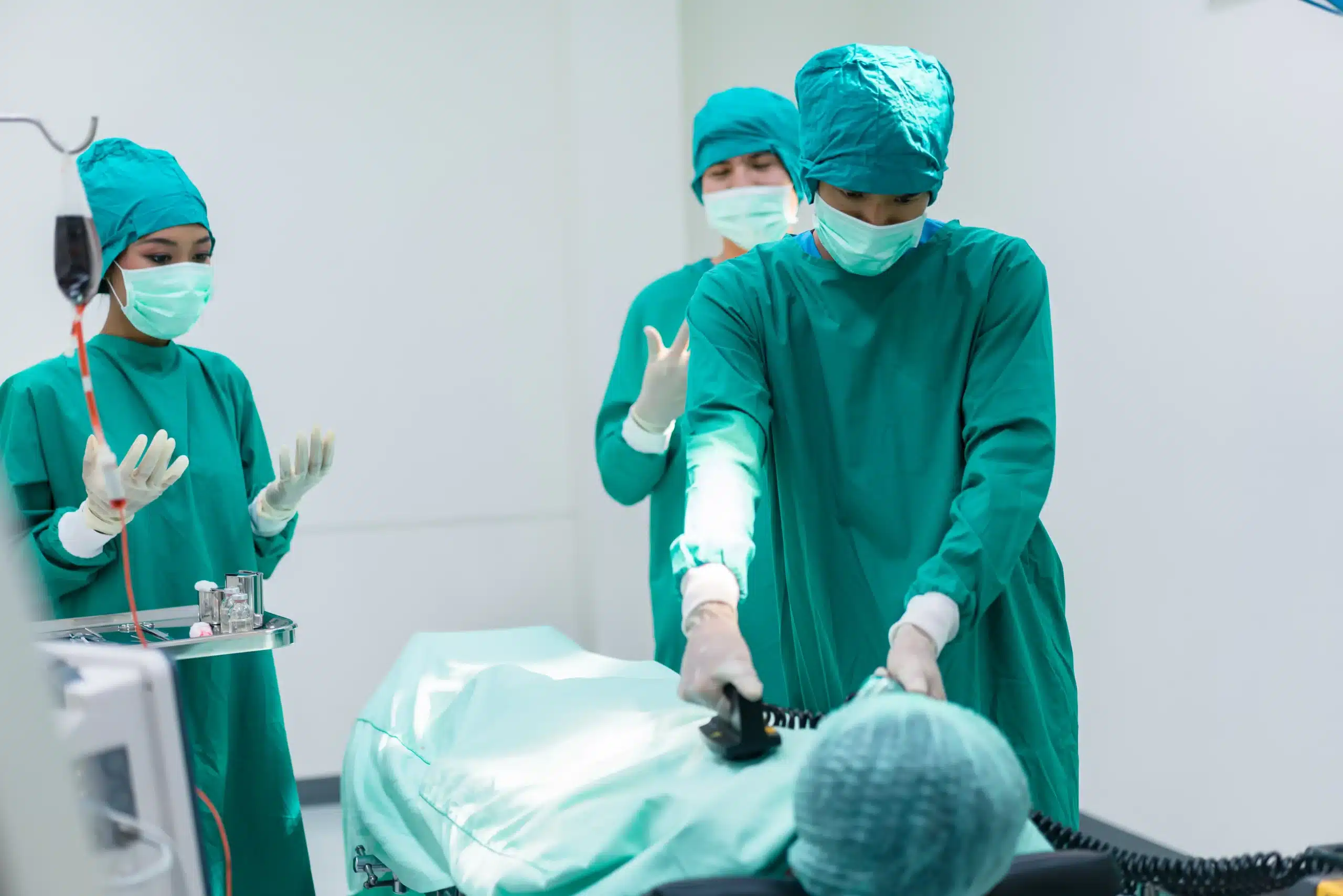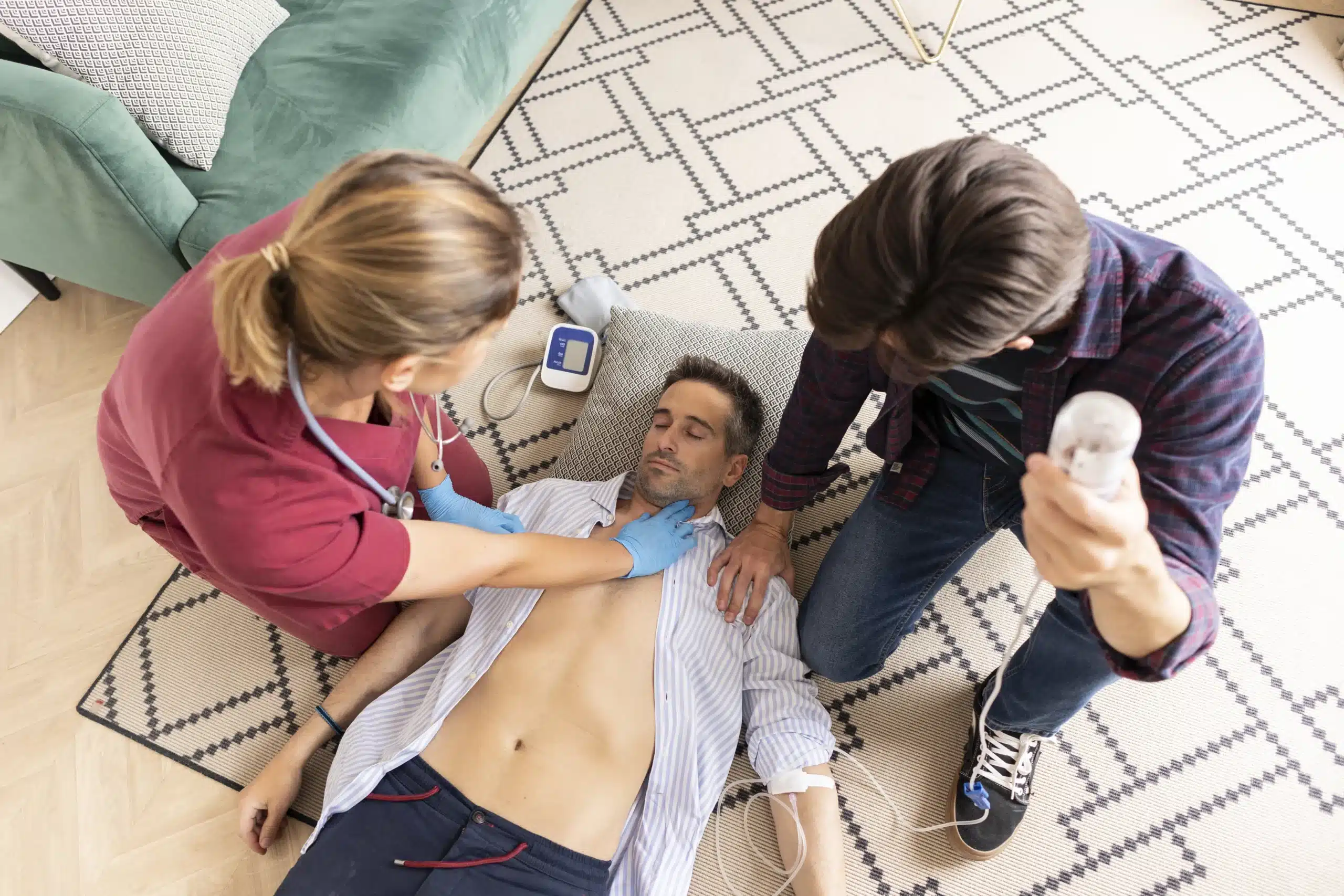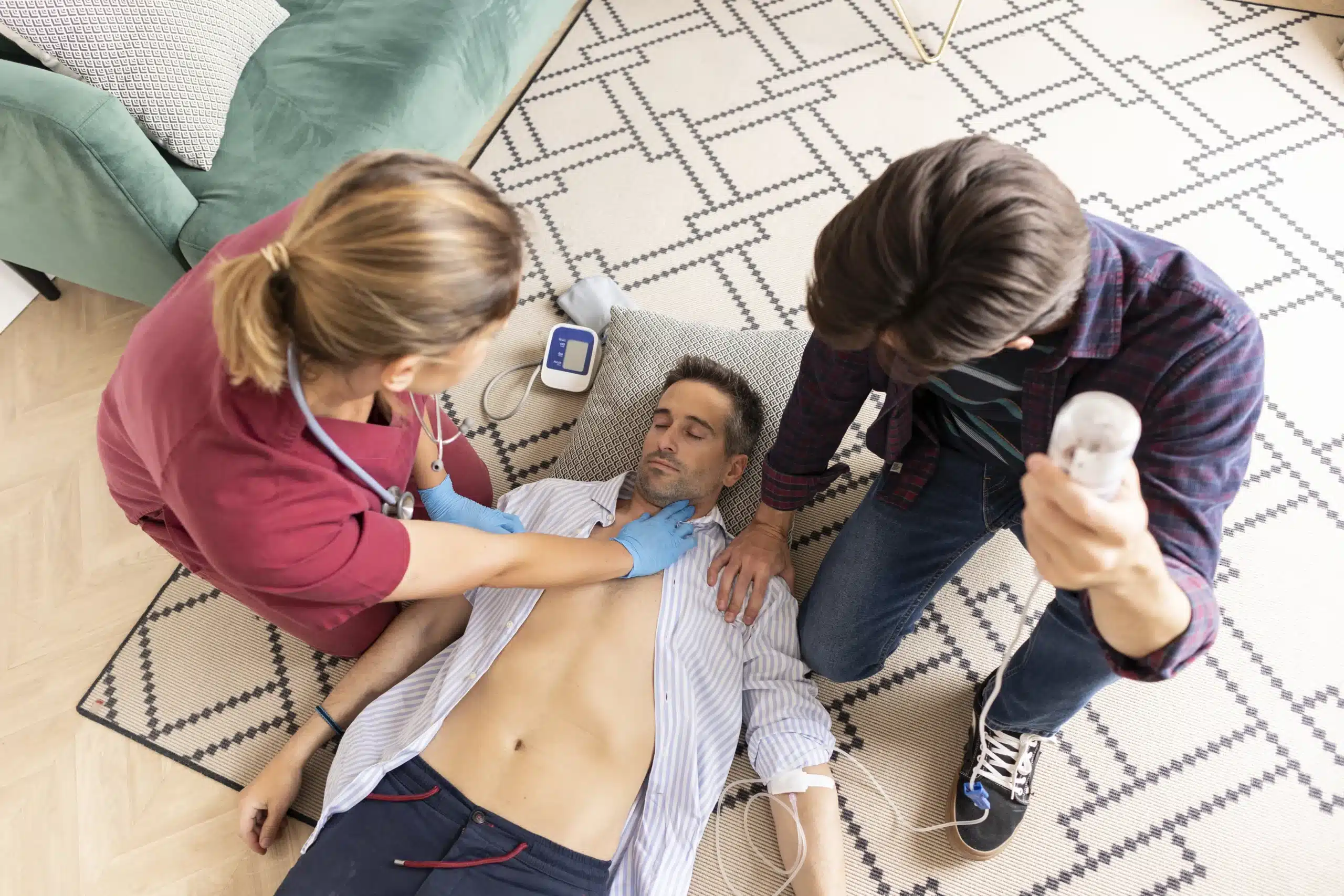As a healthcare provider, your skills can make all the difference in life-or-death situations. Staying sharp isn’t just a good idea—it’s essential. But traditional ACLS training can feel like a time-consuming hurdle. Enter RQI ACLS, a game-changer in resuscitation training. It’s designed for busy professionals like you, offering a flexible, efficient way to master advanced cardiovascular life support. This approach not only saves you time but also significantly improves your skills and confidence. If you’re searching for “RQI ACLS Classes near me,” you’re in the right place. This article breaks down everything you need to know about RQI ACLS, from its benefits and how it compares to traditional training to what to expect in a class and where to find top-notch training providers. Let’s get started!
Key Takeaways
- RQI ACLS keeps your skills sharp with less time commitment. The flexible, blended learning format and regular short practice sessions fit busy schedules while maximizing skill retention. This means you’re always ready for emergencies.
- RQI ACLS uses innovative technology and personalized learning to boost CPR quality. Real-time feedback and adaptive learning tools help you focus on areas needing improvement, building both confidence and proficiency, ultimately leading to better patient care.
- Find an RQI ACLS provider that works for you. Look for flexible scheduling, adherence to the latest AHA guidelines, and a supportive learning environment. Ask questions and understand the course structure to ensure it aligns with your learning style and career goals.
What is RQI ACLS?
RQI ACLS (Resuscitation Quality Improvement Advanced Cardiovascular Life Support) is a blended learning program combining online learning with hands-on skills sessions. Unlike traditional ACLS courses, RQI ACLS uses a “low-dose, high-frequency” approach. This means you’ll practice your skills in short, frequent sessions, rather than one long course. This method improves both skill retention and CPR quality. The program focuses on mastery learning, allowing you to progress at your own pace and demonstrate competency through regular assessments. Think of it as staying “CPR-ready” year-round. For more information, check out Northeast Community College’s resuscitation training resources.
Key RQI ACLS Features
RQI ACLS offers several key features. The program emphasizes skills mastery through short, frequent practice sessions and provides personalized feedback. It uses adaptive learning technology, meaning the program adjusts to your individual learning needs. This personalized approach helps you focus where you need the most practice. RQI also offers flexible scheduling, allowing you to complete the online portion at your convenience. The program provides real-time feedback and reporting, so you can track your progress. The American Heart Association offers an RQI program overview for more details.
RQI ACLS vs. Traditional Training
The biggest difference between RQI ACLS and traditional ACLS training is the frequency of practice. Traditional ACLS courses typically involve a single, intensive session every two years. RQI ACLS encourages ongoing practice through short, quarterly sessions. This consistent reinforcement helps maintain your skills and improves confidence in emergencies. RQI Partners explains this approach in their overview of resuscitation quality improvement. Because you’re regularly refreshing your knowledge, RQI leads to better retention and improved CPR quality. RQI Partner’s case study with the University of Rochester offers further details on this impact.
Benefits of RQI ACLS
RQI ACLS offers several advantages over traditional ACLS courses. Let’s explore some key benefits:
Improved CPR & Skill Retention
Traditional ACLS training often involves infrequent, lengthy sessions, which can lead to skill decay over time. RQI takes a different approach, emphasizing “low-dose, high-frequency” training. Instead of cramming all your learning into one long session, you’ll engage in shorter, more regular practice sessions. This method, as highlighted in the University of Rochester’s RQI case study, has been shown to significantly improve CPR skill retention and quality. Think of it like learning a language—consistent practice is key to fluency.
Flexible Scheduling
RQI ACLS offers a blended learning experience, combining online modules with in-person skills sessions. This hybrid approach provides flexibility, allowing you to complete the cognitive portion of the course at your own pace. This is particularly helpful for busy professionals who may find it difficult to attend a traditional, multi-day course. You can fit your training around your schedule, not the other way around.
Real-Time Feedback & Reporting
RQI ACLS incorporates advanced technology to provide real-time feedback on your performance. As described in the RQI Program Overview, the program uses various learning tools, including simulations and skills practice, to assess your competency. This immediate feedback helps you identify areas for improvement and refine your skills quickly. The program also generates detailed reports, allowing you and your instructors to track your progress and ensure you’re meeting the required standards.
Increased Emergency Confidence
Regular practice and consistent feedback build confidence. Knowing you have recently refreshed your skills can make a significant difference when faced with a real-life emergency. The Wexner Medical Center’s experience with RQI underscores this point, with healthcare providers reporting increased confidence in their ability to perform ACLS effectively. This confidence translates to better patient outcomes and a more positive work environment.
Find RQI ACLS Classes Near You
Finding the right RQI ACLS course that fits your schedule and learning style is easier than you think. Here are a few places to start your search:
Hospitals & Healthcare Facilities
Many hospitals and healthcare facilities have adopted the RQI program to elevate their CPR training standards. The RQI method moves beyond the traditional classroom model by incorporating frequent low-dose practice sessions, typically quarterly, to help healthcare professionals maintain their life-saving skills. This consistent reinforcement helps ensure competency in high-pressure situations. For a real-world example, see how the University of Rochester integrated RQI training. Contact your local hospital or healthcare system to inquire about their RQI offerings.
Community Colleges
Community colleges are increasingly offering accessible RQI ACLS training options. They often provide a blend of online and in-person resuscitation training for healthcare providers. Northeast Community College, for instance, offers various resuscitation courses, including Advanced Cardiac Life Support (ACLS), Basic Life Support (BLS), and Pediatric Advanced Life Support (PALS). Check with community colleges in your area to explore available programs.
Online Training
If you need a flexible learning experience, online training platforms offer convenient RQI ACLS certification. Programs like the HeartCode® ACLS Online course through the American Heart Association use adaptive learning technology. This personalized approach adjusts to your learning pace. Online training makes it much easier for busy professionals to fit essential training into their schedules.
AHA Training Centers
American Heart Association (AHA) Training Centers are reliable resources for CPR training. The RQI program offered through these centers provides an evidence-based approach to maintaining CPR skills competency and issues AHA course completion cards. This makes AHA Training Centers a trusted choice for healthcare professionals seeking certification and ongoing skill development. You can easily locate a Training Center near you on the AHA website.
RQI ACLS Class Costs
When considering RQI ACLS training, understanding the costs is essential. This section breaks down the pricing structure, compares it with traditional ACLS courses, and highlights potential savings.
Pricing
RQI ACLS certification generally involves two parts: online cognitive training and a separate in-person skills assessment. The online portion is typically included in the overall class price. As Northeast Community College explains, the online training covers the knowledge portion of the course. You’ll then schedule an in-person skills session using voice-assisted manikins (VAM) with real-time feedback. This blended learning approach allows for flexible scheduling and personalized learning. Contact your chosen provider, like Fairfield CPR Classes, for specific pricing details, as costs can vary based on location and included materials. Fairfield CPR Classes also offers a low price guarantee so you can feel confident in your investment.
Cost Comparison with Traditional ACLS
Traditional ACLS classes often involve a larger upfront cost for a single course. While this might seem straightforward, consider the long-term expenses. Traditional courses require complete recertification every two years. RQI, on the other hand, uses a subscription model with quarterly skills assessments. This approach, as highlighted in a University of Rochester case study, focuses on consistent practice and skill maintenance, leading to cost savings over time, especially for larger organizations. For individuals and smaller groups, the cost comparison requires a closer look at your specific needs and how often you anticipate needing refresher training.
Potential Savings
The RQI subscription model offers several avenues for potential savings. RQI Partners points out that the ongoing practice and assessment format reduces the need for full retraining every two years. This translates to lower costs, particularly for organizations with high staff turnover. The detailed performance reports provided through RQI can help identify areas for improvement in overall CPR practices, potentially leading to better patient outcomes and reduced risk. For groups, Fairfield CPR Classes offers discounts on RQI and other courses, making high-quality training more accessible.
What to Expect in an RQI ACLS Class
RQI ACLS blends online learning with in-person skills sessions, offering flexibility and personalized learning. Here’s what you can expect:
Course Content & Learning
The RQI ACLS course uses a “low-dose, high-frequency” model. Instead of one lengthy course, you’ll engage in shorter, more frequent learning and practice sessions. This method improves knowledge and skill retention. The online portion, included in the class price, covers the cognitive aspects of ACLS, allowing you to learn at your own pace. The program uses adaptive learning technology, adjusting to your performance and focusing on areas where you need additional practice. This personalized learning path creates a more efficient and effective experience.
Equipment & Technology
RQI ACLS classes use advanced equipment, including voice-assisted manikins (VAMs). These manikins provide real-time feedback on your CPR technique, including compressions, ventilations, and overall performance. The VAMs use audio and visual cues to guide you, helping you refine your skills and build confidence. This technology enhances learning and ensures you receive immediate feedback. The University of Rochester improved CPR training using this technology.
Assessments
After completing the online portion, you’ll participate in a hands-on skills assessment. This session allows you to demonstrate your proficiency in the skills learned online. The assessment uses the same VAM technology, providing real-time feedback. Upon successful completion of both the online and in-person components, you’ll receive your American Heart Association ACLS Provider eCard.
Who Should Take RQI ACLS?
RQI ACLS equips healthcare professionals with the skills and confidence to handle cardiac arrest situations effectively. But who exactly benefits most from this specialized training? Let’s explore the key groups who should consider RQI ACLS certification.
Healthcare Professionals & Specialties
Any healthcare provider who might respond to a cardiac emergency can benefit from ACLS training. It’s not limited to specific specialties or settings. It’s essential knowledge for a wide range of professionals, from emergency room physicians and nurses to respiratory therapists and paramedics. Anyone who might encounter a cardiac emergency—whether in a hospital, clinic, or even a mobile medical unit—should prioritize maintaining their ACLS skills through RQI. This training ensures they’re prepared to deliver high-quality CPR and other life-saving interventions when every second counts.
Institutions Using RQI
Many healthcare institutions recognize the value of the RQI program and have integrated it into their training protocols. Hospitals, clinics, and other healthcare facilities often use RQI to ensure their staff maintains up-to-date ACLS skills. The program’s “low-dose, high-frequency” training approach leads to higher-quality CPR skills. The American Heart Association’s evidence-based resuscitation education is considered the gold standard in healthcare training, with over 90% of hospitals utilizing the AHA BLS and ACLS programs. By adopting RQI, these institutions demonstrate a commitment to providing the best possible patient care during cardiac emergencies.
Prepare for Your RQI ACLS Class
So, you’re ready to sign up for an RQI ACLS course? Great! This section covers how to get ready, including prerequisites and the time commitment.
Prerequisites & Study Materials
Before starting HeartCode RQI ACLS, familiarize yourself with the course format. It’s a self-directed, hybrid program (part online and part in-person) using adaptive learning. This personalized learning adjusts to your performance in real time. The RQI program covers three main components: cognitive learning, hands-on psychomotor skills practice, and simulated patient cases, according to the American Heart Association. Check with your chosen training center about prerequisites, as some may require current BLS certification.
Time Commitment
RQI ACLS training is designed to be efficient. The online portion takes approximately two hours, while the in-person skills session and simulation typically last 30–60 minutes (Northeast Community College). This flexible approach helps improve both CPR quality and knowledge retention, as highlighted by RQI Partners. This structure makes it easier to fit the training into your busy schedule.
Top RQI ACLS Training Providers
Finding the right RQI ACLS training provider is key to a positive learning experience. Here are a few reputable options to consider:
Fairfield CPR Classes
Fairfield CPR Classes is a woman-owned American Heart Association (AHA) Training Center offering a range of courses, including RQI ACLS training. They emphasize flexible scheduling, with classes available daily, catering to busy healthcare professionals. Fairfield CPR Classes’ curriculum adheres to the latest AHA standards, ensuring participants receive high-quality, nationally recognized education. They serve Fairfield, Vacaville, and Suisun City, CA. For those interested, explore their RQI classes for more details.
RQI Partners
RQI Partners collaborates with the American Heart Association and other healthcare organizations to improve CPR training through the Resuscitation Quality Improvement (RQI) program. This program uses short, frequent training sessions to help healthcare providers maintain their CPR skills effectively. RQI Partners’ focus on ongoing education and skill retention is invaluable in emergency situations. Learn more about how RQI Partners modernizes CPR training in this informative blog post.
Laerdal Medical
Laerdal Medical provides medical simulation and training solutions, including resources for ACLS and CPR. Known for high-quality manikins and training equipment, Laerdal enhances the learning experience for healthcare professionals. Their commitment to improving patient outcomes through effective training aligns perfectly with the goals of the RQI program. You can find more details about Laerdal Medical and their training solutions in this article on RQI training.
American Heart Association
The American Heart Association (AHA) is the driving force behind the RQI program, setting the guidelines and providing resources for CPR and ACLS training. Their emphasis on evidence-based practices ensures training programs reflect the latest research and recommendations in resuscitation science. AHA certification is widely recognized in healthcare, making it a trusted source for training. Explore AHA CPR class options in Fairfield in this helpful guide.
HealthStream
HealthStream is a healthcare workforce development company offering various training solutions, including RQI programs. Their online learning platforms make ACLS training and other essential courses easily accessible to healthcare professionals. HealthStream’s focus on improving workforce competency aligns with the RQI initiative, making them a valuable resource for ongoing education. For more information on ACLS training, read this blog post.
Addressing RQI ACLS Concerns
It’s normal to have questions about a new training program. Let’s address some common questions about RQI ACLS.
Certification Misconceptions
One common misconception is that ACLS certification is permanent. ACLS certification requires regular renewal to ensure healthcare providers stay current with the latest advancements in ACLS care. RQI’s approach acknowledges this by focusing on frequent, low-dose practice to maintain competency. This model shifts away from the idea that initial certification is sufficient. RQI emphasizes continuous improvement and skill refinement. Think of it like renewing your driver’s license—periodic renewals are necessary to stay qualified.
Course Complexity
Some healthcare providers worry that RQI ACLS might be overly complicated. The HeartCode RQI ACLS course is designed to be user-friendly. It’s a self-directed, hybrid program that combines online learning with in-person skills sessions. The online portion uses adaptive learning technology, creating a personalized learning experience that adjusts to each learner’s pace and performance. This approach simplifies the learning process and makes it more efficient.
Practice Opportunities
RQI’s emphasis on “low-dose, high-frequency” training sets it apart from traditional ACLS courses. Instead of infrequent, lengthy recertification sessions, RQI incorporates quarterly practice sessions. This approach improves CPR skill retention and quality, as highlighted in an RQI Partners case study featuring the University of Rochester. These regular practice opportunities help healthcare professionals maintain their skills and confidence in emergencies.
Time Management
Many healthcare providers are concerned about the time commitment required for ongoing training. RQI offers a flexible, manageable approach. The short, frequent practice sessions fit easily into busy schedules, minimizing disruption to patient care. The American Heart Association supports more frequent training for BLS and ALS, especially for providers likely to encounter cardiac arrest. RQI’s structure directly addresses this recommendation, making it a time-efficient way to maintain essential life-saving skills.
Choose the Right RQI ACLS Class
So, you’re ready to enhance your resuscitation skills with RQI ACLS? Great! Now, let’s find the perfect class for your needs.
Factors to Consider
Choosing the right RQI ACLS class means understanding a few key elements. First, consider the course structure. Do you prefer self-paced learning? Then the HeartCode RQI ACLS program, a blended learning course with online modules and in-person skills sessions, might be a good fit. This hybrid approach uses adaptive learning technology, adjusting to your performance in real time. If you value flexibility, this is a big plus.
Next, think about the training methodology. RQI emphasizes “low-dose, high-frequency” training: short, regular practice sessions to keep your skills sharp. Unlike traditional programs with longer, less frequent training, the RQI program focuses on consistent reinforcement. This approach improves CPR quality and retention—like regular exercise for a muscle. Small, consistent workouts build strength over time.
Finally, consider the performance feedback offered. A good RQI ACLS class provides specific, actionable feedback. Look for programs with various learning tools and simulated patient cases. This comprehensive approach, combining cognitive learning, hands-on skills practice, and realistic scenarios, builds understanding and confidence.
Questions for Providers
Before signing up, ask potential providers a few questions. First, clarify the course content. Make sure you understand the topics and how the material is presented. The American Heart Association offers resources outlining what to expect from CPR and ECC courses.
Address any concerns. If you’re worried about mastering specific skills, ask about feedback mechanisms and support systems. Some programs offer FAQs addressing common student concerns.
Finally, clarify any misconceptions about RQI ACLS certification. Some believe ACLS certification is permanent. Understand the recertification requirements to maintain your credentials. By asking questions and doing your research, you’ll find the RQI ACLS class that best fits your learning style and professional goals. Investing in your skills is an investment in your patients’ lives.
Related Articles
- Advanced Cardiac Life Support (ACLS) in Fairfield – Fairfield CPR Classes
- ACLS Courses in Vacaville: Your Complete Guide – Fairfield CPR Classes
- RQI in Fairfield: Your Guide to Modern CPR Training – Fairfield CPR Classes
- ACLS Certification Near Me: Your Complete Guide – Fairfield CPR Classes
Frequently Asked Questions
What exactly is RQI ACLS and how does it differ from traditional ACLS? RQI ACLS is a more modern approach to Advanced Cardiovascular Life Support training. It uses a “low-dose, high-frequency” method, meaning you practice your skills in short, regular sessions, typically quarterly, rather than one long course every two years. This helps you retain information better and perform CPR more effectively. Traditional ACLS involves less frequent, longer sessions, which can make it harder to remember everything you’ve learned when an emergency arises.
Why should I choose RQI ACLS over traditional ACLS training? RQI ACLS offers several advantages. The regular practice sessions help you maintain your skills and boost your confidence. The flexible online component lets you learn at your own speed and fit the training around your schedule. You also receive real-time feedback and reporting, so you can track your progress and identify areas for improvement. Traditional ACLS often lacks this level of personalized feedback and flexibility.
How much does RQI ACLS training cost, and how does it compare to traditional ACLS? RQI ACLS typically involves a subscription model with quarterly skills assessments, while traditional ACLS courses have a larger upfront cost for a single class, then require full re-certification every two years. Over time, RQI can be more cost-effective, especially for larger organizations. For individuals, the best value depends on your specific needs and how often you anticipate needing refresher training. Contact your chosen training provider for specific pricing details.
What can I expect during an RQI ACLS class? RQI ACLS combines online learning with hands-on skills sessions. You’ll complete online modules at your own pace, covering the cognitive aspects of ACLS. Then, you’ll participate in in-person skills sessions using high-tech manikins that provide real-time feedback on your performance. This blended learning approach offers flexibility and personalized instruction.
Who should consider taking RQI ACLS? RQI ACLS is beneficial for any healthcare professional who might need to respond to a cardiac emergency. This includes doctors, nurses, paramedics, respiratory therapists, and other healthcare providers. If your job involves the possibility of encountering a cardiac arrest situation, RQI ACLS can equip you with the skills and confidence to provide effective care.
